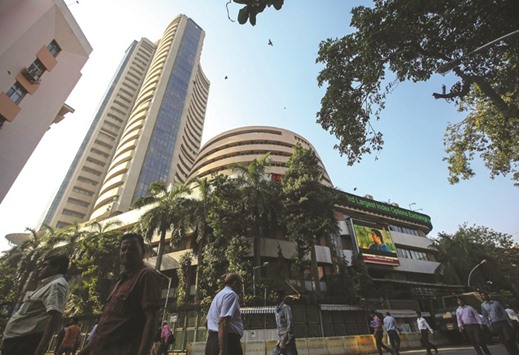Automakers and lenders lifted Indian stocks to near a record as emerging-market equities rallied after a slowdown in US job creation dimmed the prospects of an interest-rate rise this month.
The S&P BSE Sensex led gains among developing-country peers and the NSE Nifty 50 Index closed 0.6% below its March 2015 record as trading resumed after a holiday.
The BSE Sensex gained 445.91 points, or 1.56%, to end at 28,978.02 yesterday. Indian stocks capped their best week in two months on Friday as investors faced with near-zero rates in the developed world hunt for higher-yielding assets.
Asia’s third-biggest economy expanded 7.1% in the April-June quarter from a year earlier, the fastest among major economies, official data showed last week.
“With half the debt in the world carrying negative interest rates, flows to emerging markets have accelerated as investors look for higher returns,” said Amit Shah, chief executive officer and co-founder at IIFL Asset Management Ltd, which has $13.5bn in global assets under management and advisory. “While overseas investors are happy with 1% to 2% growth, India’s growth rate of 7% should make them ecstatic.”
Global equities have gained ground since US payrolls data on Friday helped damp the chances of a US interest rate increase this month. Futures showed the likelihood of a September rate increase at 32% and 59% by December, compared with 34% and 60% on Thursday, the day before the employment data.
Foreigners bought $222mn of Indian equities last week, extending the year’s inflow to $6.1bn, the most in Asia after Taiwan and South Korea, data compiled by Bloomberg show. Domestic funds pumped $248mn into stocks last week, ending eight weeks of withdrawals, the data show.
“There’s a gush of overseas money in search of higher yields and India is perhaps the only market in Asia offering prospects of sustainable growth,” Chokkalingam G, managing director at Mumbai-based Equinomics Research & Advisory, said by phone.
Tata Motors, owner of Jaguar Land Rover, rallied to the highest in 19 months. The company secured an order for more than 5,000 buses from state and city governments, according to an exchange filing. Maruti Suzuki India, the largest carmaker, and two-wheeler producer Hero MotoCorp climbed to records.
Axis Bank, ICICI Bank, State Bank of India were among the best performers on the Sensex. Yes Bank jumped 3.8% to a record. The lenders drove the S&P BSE Bankex index to its highest level since January 2015.
The 26% rebound in the benchmark indexes from their lows in February has pushed up valuations. The Sensex is valued at 16.7 times projected 12-month earnings, the most expensive since January 2011 and the higher than the five-year mean of 14.4, according to data compiled by Bloomberg. The MSCI Emerging Markets Index trades at a multiple of 12.
The gauges of small- and mid-cap companies are trading at more than twice the valuation of the main indexes.
“Valuations are a concern but we expect the large-cap laggards to catch up as company earnings improve, tax collections increase and inflation ebbs,” Chokkalingam said.
Meanwhile the rupee yesterday closed at a four-month high against the US dollar after local equity markets gained over 440 points.
Gains were also boosted due to lower-than-expected US payroll data which reduced fears of a rate hike by the US Federal Reserve among the investors.
This was the fifth consecutive session when the rupee closed higher.
The rupee closed at 66.53 per dollar—a level last seen on May 3—up 0.43%, the maximum gain since May 25, from its previous close of 66.83. The rupee opened at 66.55 per dollar and touched a high of 66.49, a level last seen on May 9.
Market expectations for a Fed rate hike in September fell to 24% from 27% after non-farm payrolls data. The US economy added 151,000 jobs in August, with the unemployment rate coming in at 4.9%.
The 10 year bond yield fell in eight out of ten trading sessions. The 10-year bond yield closed at 7.098%, compared with its Friday’s close of 7.118%. Yield on 6.97% 2026 bond, which is new 10-year debt, down 4 basis points to 6.92%. Bond yields and prices move in opposite directions.
One basis point is one-hundredth of a percentage point.
The rupee is down 0.56% till date this year, while FIIs have bought $6.05bn in equity and sold $1.21bn in debt markets. Asian currencies closed mixed. The Indonesian rupiah was up 0.22%, Thai baht 0.21%, Japanese yen 0.12% and Singapore dollar 0.06%. However, the Malaysian ringgit was down 0.19%, Philippines peso 0.18% and Taiwanese dollar 0.14%.
The dollar index, which measures the US currency’s strength against major currencies, was trading at 95.613, down 0.25% from its previous close of 95.844.
Traders are cautious ahead of the European Central Bank’s policy decision on benchmark interest rate number due on Thursday.
Chinese CPI (Consumer Price Index) and PPI (Producer Price Index) readings and India’s industrial production and manufacturing output data for July will sway market sentiment on Friday.

People walk by the Bombay Stock Exchange building in Mumbai. The BSE Sensex closed up 445.91 points to 28,978.02 yesterday.
